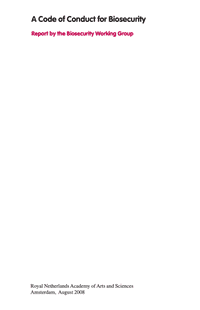A Code of Conduct for Biosecurity: Report by the Biosecurity Working Group
[Code of Conduct for Biosecurity]
This Dutch code of conduct details rules aimed at preventing the misuse of life sciences research in compliance with the BWC. These rules apply to a variety of roles and organizations, and organizations may tailor the implementation of those rules to best fit their institution.
SUMMARY
This document contains a national code of conduct on biosecurity as well as background and explanation for the text of the code of conduct. The code of conduct is intended to prevent the misuse of biological agents and toxins. It specifically aims to prevent the development, production, or stockpiling of biological weapons. The code of conduct is aimed at institutions, organizations, and professionals currently working in the life sciences.
The sixth Biological Toxin Weapons Convention (BTWC) in 2006 emphasized the importance of raising awareness around dual use research and establishing a national biosecurity code of conduct for scientists to prevent the misuse of this research. The Dutch Ministry of Education, Culture and Science asked the Royal Netherlands Academy of Arts and Sciences (KNAW) to develop such a code of conduct. KNAW advises the Dutch government on issues related to science and literature. KNAW is also the InterAcademy Panel’s ‘lead academy’ for all issues related to biosecurity. To create this document, KNAW assembled a working group to study how to implement a national biosecurity code of conduct, with a focus on how similar measures had been implemented at the national and institutional level. As of September 2021, the document is only available in English and no further updates have been published.


..png)
